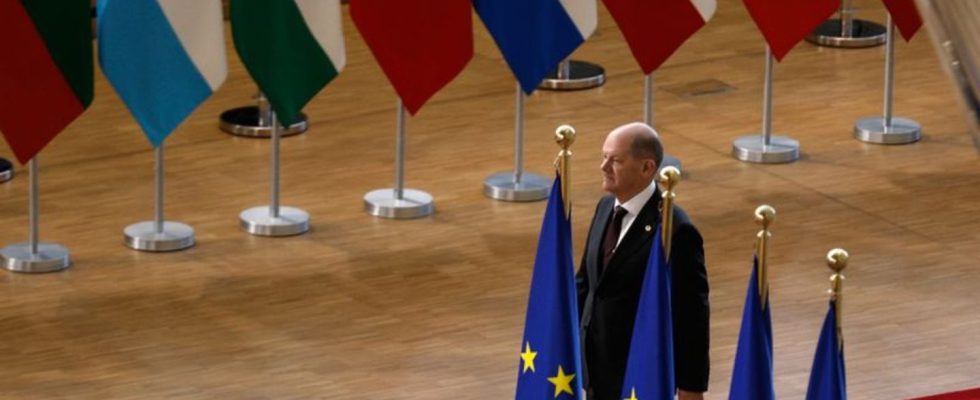Brussels
World crises instead of competition policy: The EU summit
Chancellor Olaf Scholz at the EU summit in Brussels. photo
© Omar Havana/AP/dpa
How can a major war in the Middle East be prevented? And what is the problem with support for Ukraine? At an EU summit, the main focus will once again be on foreign policy. The mood is dark.
The worrying developments in the Middle East and Ukraine have kicked off a planned conference on economic issues EU summit in Brussels overshadowed.
At the beginning of the two-day top-level meeting, the agenda of Chancellor Olaf Scholz and the heads of state and government of the other 26 EU states was primarily focused on discussions about the two major sources of conflict. Topics such as the international competitiveness of the European Union and plans for a real capital markets union will only be discussed this Thursday.
At the beginning of the summit, Scholz urgently called for more weapons to be delivered to Ukraine. “The Russian war of aggression is being carried out with great brutality and we know that we have to do more than we have done so far to support Ukraine,” said the SPD politician. In addition to ammunition and artillery, the Ukrainian armed forces particularly needed air defense systems.
Scholz asks partners to take a look
Scholz pointed out that the federal government has already decided to deliver another Patriot anti-aircraft missile system. The “terrible” Russian air strikes showed “that it is necessary to do something about this,” said the Chancellor. At the top meeting in Brussels it will also be important for him to convince many others “that they should go home again and see: what’s going on.” Action must now be taken quickly.
With a view to the dramatic situation in the Middle East, Scholz once again appealed to Israel on Wednesday evening not to respond to Iran’s rocket and drone fire with its own massive attack. Israel should instead use its success in repelling the attack to strengthen its own position throughout the region, he said.
Equal protection for every sky?
In his speech via video to the heads of state and government, Ukrainian President Volodymyr Zelensky referred to the successful defense against Iranian missile and drone attacks on Israel. “Unfortunately, in Ukraine, in our part of Europe, we do not have the level of defense that we saw a few days ago in the Middle East,” he said. “Our Ukrainian skies and the skies above our neighbors deserve the same security.” Ukraine needs more anti-aircraft weapons, he said, citing the Russian missile attack on the city of Chernihiv on Wednesday that left 17 dead as one reason. He thanked Germany for its willingness to hand over a third Patriot system.
Fear of war between Israel and Iran
After Iran’s major attack on Israel at the weekend, there is great concern in the EU that the conflict could spread further if Israel retaliates harshly. The Iranian attack was triggered by a suspected Israeli attack on the Iranian embassy in the Syrian capital Damascus. At the beginning of the month, two generals from the Iranian Revolutionary Guard were killed.
A draft of the summit’s final declaration calls on Israel and Iran to refrain from further attacks against each other. “The European Council (…) urges all parties to exercise utmost restraint and not to take any action that could increase tensions in the region,” the text says. The EU is ready to work with all partners to avoid a further escalation of tensions.
Revolutionary Guards could be put on the terrorist list
The summit should also reaffirm the EU’s willingness to impose further sanctions against Iran, particularly in connection with drones and missiles. Scholz also made it clear that he also sees a possible approach to classifying the Iranian Revolutionary Guard as a terrorist organization, as demanded by Israel. There is a judgment on the issue of the activities of this organization, he explained. This could be a starting point for listing the Revolutionary Guards. A legal review of the issue is currently underway in the EU.
Israel has long been calling for the Iranian Revolutionary Guard to be classified as a terrorist organization; this was reiterated after the Iranian attack at the weekend. In the past, the EU had always emphasized that a terror listing of the Guards was currently not legally possible because it would require a national court decision or a ban order from an administrative authority.
Last December, the Düsseldorf Higher Regional Court made a judgment about an attempted attack on a synagogue in Bochum, to which Scholz was now probably referring. At that time, a German-Iranian was sentenced to a total prison sentence of two years and nine months for arranging serious arson and attempted arson (file number III-6 StS 1/23).
New demands for sanctions against Russia
Belgium and the Czech Republic also came to the top meeting with new demands for sanctions against Moscow – in view of possible Russian infiltration of the upcoming European elections. “We cannot allow Russia to get away with such a blatant attack on our democratic institutions and principles,” the leaders of both countries wrote in a letter. That’s why it’s time for a new sanctions regime. This refers to the legal framework within which punitive measures can be imposed against people and organizations.
Belgium’s judiciary is currently investigating information from pro-Russian interference networks with activities in several European countries about Moscow’s attempt to influence the European elections scheduled for June. At the end of March, the Czech Republic also placed the pro-Russian internet platform “Voice of Europe” (VoE) on the national sanctions list following intelligence investigations.

